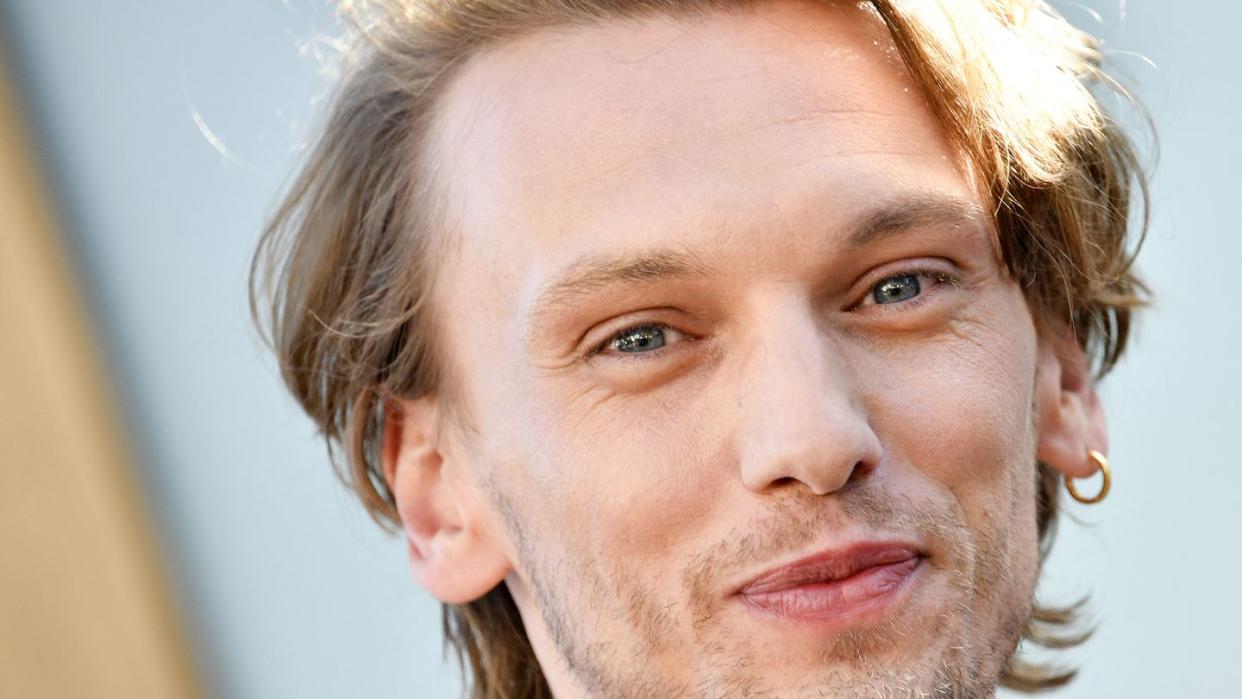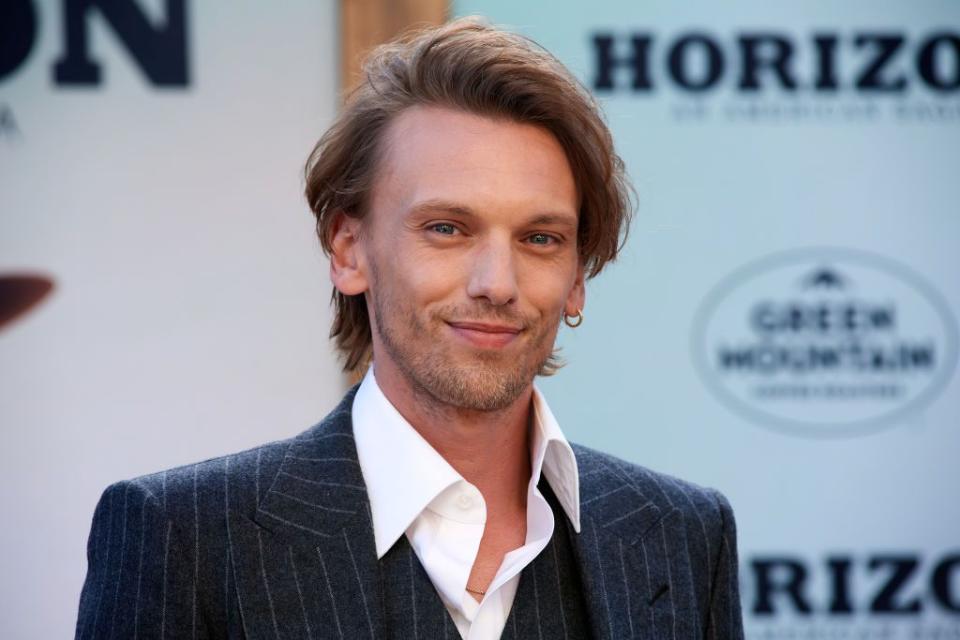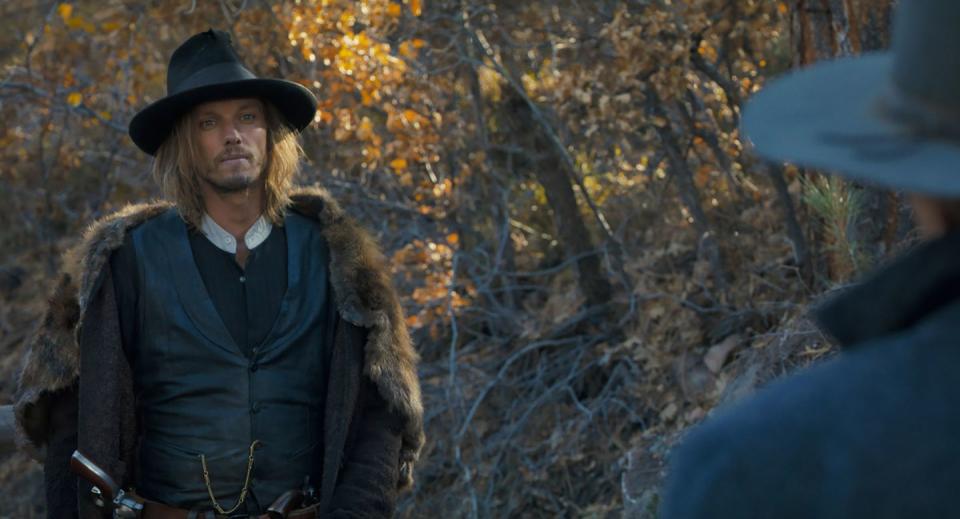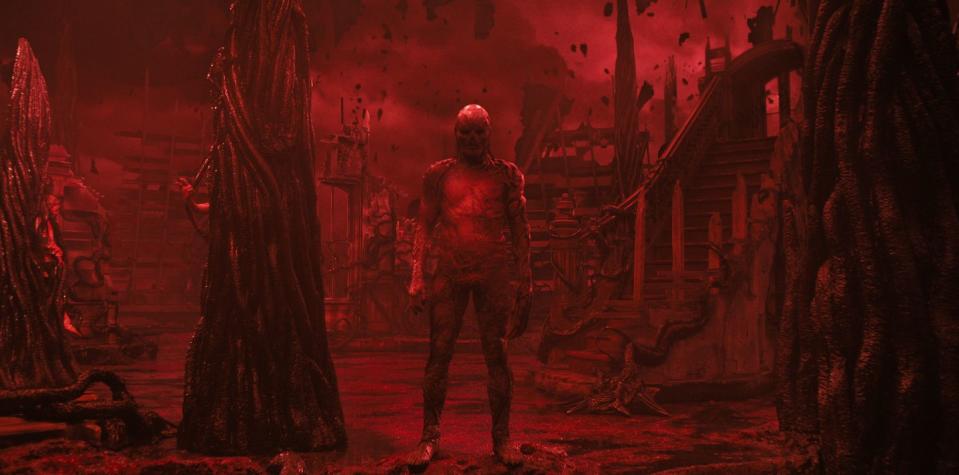Jamie Campbell Bower Is the Best Damn Thing About ‘Horizon’

Vecna, the human-born creature played by the actor and musician Jamie Campbell Bower in season 4 of Netflix’s Stranger Things, is a grotesque figure. He’s the transmogrification of a traumatized little boy who became a disquietingly evil young man. Bower also plays that young man, Henry Creel, with such big-eyed lunacy that it should have been off-putting—inspiring the kind of collective fan revulsion of, say, King Joffrey. Instead, Bower’s embodiment of the chimeric lord of the Upside Down catapulted him further into the hearts and minds (and hormones) of millions of viewers.
Bower is now starring as Caleb Sykes, the youngest, saddest brother of a violent patriarchy, in Kevin Costner’s self-directed-and-starring four-part Civil War opus, Horizon: An American Saga. The first chapter—spanning the landscapes and bloodshed of 1861 to 1865—winds between stories of good and evil and vindication, helmed by a mustachioed Costner as protagonist Hayes Ellison. Bower’s Caleb is feral. When he storms through the doorway, the temperature drops. The bonds of familial pain are wrapped tight around his neck, and most of his time onscreen is spent snarling. Costner’s initial idea for Horizon, cowritten with the director Jon S. Baird and funded in part with a generous $38 million helping from Costner’s wallet, emerged right around the time Bower, now thirty-five, was born.
Bower’s own film debut came in 2007, playing opposite Johnny Depp in Sweeney Todd: The Demon Barber of Fleet Street. He was eighteen at the time, but the velvet tenor he lent to ballads like “Johanna” cut deep in its resonance. A string of roles in gigantic movie franchises followed soon after: Harry Potter, Twilight, Fantastic Beasts. (Bower reprised a version of “Johanna” for an online event during the at-home stretch of the pandemic, replete with a fully-formed-adult crystalline bone structure and a Twilight: New Moon poster visible in the background. The Internet went wild.)
On the heels of peak Vecna hype, in 2022, Bower shared candidly about his years in active addiction, the depths he was submerged in, and the in-patient psychiatric treatment he underwent to help himself. In conversation, his speech and manner are infused with an essence of the hard-earned humility and thoughtfulness that often accompany recovery.
When we spoke on Zoom ahead of Horizon’s release, Bower was in Atlanta, filming season 5 of Stranger Things. (He didn't provide spoilers, sadly.) Bower is effusive in the love he has for his work. He is British, but exudes a sense of Americana, an unabashed admiration of the country’s pastoral landscapes, mythos, and artistry, including that of Costner. There is a lyrical wisdom to the way he describes not taking his fame too seriously, and his acceptance of being mortal—and present—in his ever-ephemeral, occasionally gnarly line of business.

ESQUIRE: What was it like to shoot with Kevin?
JAMIE CAMPBELL BOWER: I was born in 1988. Kevin Costner is a movie star in the original [sense of the] term. He's just the guy. I grew up with his films—they showed us Dances With Wolves in school—and to be opposite him was amazing. And when you add in the dynamic of—not only are you acting opposite him, he's also directing you at the same time? I mean, c’mon. It was a boyhood dream. What can I say?
Do you remember the first Kevin Costner film you saw as a kid?
I do. It was Waterworld.
Does he know that?
I don't think so. I didn’t have the guts to say anything so I kept my mouth shut. But my cousin and I just loved that film growing up.
Did Horizon actually film in the desert? Was any of it on a soundstage?
Our base camp was in Moab, [Utah], and then we were in the La Sal Mountains, about an hour and a half away. Everything that you see onscreen is real. I watched 10 minutes of the film on a sizzle reel in Kevin’s trailer with the producers when it was finished and honestly, I cried. I fully wept. I love this country, the geography, so much—I’d spent a lot of time in Moab before all this, on a more personal level—and to see how the landscape was captured, the way it looks, just…
I've seen the film in its entirety now too. Jon [S. Baird] and Kevin's writing is so beautiful. That's always a blessing as a performer. It was one of those things when I got the script, and was asked if I wanted to audition for it, and went, uh, yeah. The story that's going on here, weaving between all the characters—the way that it’s presented is very unique.

Your film debut was a singing role in Sweeney Todd. Was there ever a world in which you might've gone the musical-theater route full-time?
When I was growing up, I did National Youth Theater and National Youth Music Theater. Cut to years later, after Sweeney Todd, when I was about 26, and I ended up doing a musical version of Bend It Like Beckham on the West End. I was Joe, the coach—Jonathan Rhys Myers’ character from the film.
Was there a point where that’s what I wanted to go for? Absolutely. It just so happened that Sweeney Todd came along right when I was at the end of my school career. I felt that if I took my foot off the gas and spent three years going to drama school, I’d lose the bit of the momentum that I was getting at that moment. But would I do Broadway again? Yes. If the project was right, then there’s no way that I would say “no.”
Is there any chance the Duffer Brothers will let you sing in season 5 of Stranger Things?
[Laughs.] Yeah, that can go on the list of many other things that I am irritating them about at the moment. I'll have to think about what song it could be; it would have to do with the mind, wouldn't it? Something to do with being trapped in somebody's mind, like Barbara Streisand’s The Way We Were. [Sings] Memories, like the corners of my mind…
How did your personal experience with recovery inform your performances of Caleb and Vecna?
With Caleb, one of the things that really struck me was when his mother comes out in an early scene and hits him. He grabs her by the hand and he says, You ain't hurting nobody no more. In a sort of grand blockbuster way, Caleb, his family, they’re the big, bad guys, and that’s great and we love that. But I am a firm believer in that nobody's born bad. We are products of our environment. He had experienced so much violence from others. It built up into his own violence, his own anger, and fear. Fear is a really interesting thing, particularly in recovery; it just manifests itself in a way because it's unprocessed. It sticks around and becomes resentment.
Going into Stranger Things, I was at a point in life where I was feeling, Oh, I've done all this great work and it's amazing. I feel beautiful, life is gorgeous, and colors are beautiful. And then, all of a sudden, to play Vecna it was, Oh, by the way, you've got to go back into that resentment again. And I was just like, Noooo! Oh my God!
The scene between Caleb and his brother—when he is kicked in the chest—seems to tap into that pain and sadness you mention. How much did that hurt to film, both physically and emotionally?
I've got to put my hands up here. As much as I would like to present myself as the toughest motherfucker in the whole world, I didn't take that kick in the chest. We had a lovely stunt guy there who did. And I gave that to him as a gift because I'm such a kind person.
From the script, I certainly remember the feeling that I felt. I certainly remember the idea of that fury and sadness. Going back to things you learn when you’re in recovery—the why of why we do things and when we get things wrong. For Caleb, he’s always trying to one-up his social status, to present himself as the top dog. And so, when he doesn't get that, there is a petulance to him, a rage that comes out. That’s one of his driving forces. It’s the same kind of thing with Vecna, Henry, too. Loneliness is quite persistent in their story.

How do you shake those characters off at the end of the day?
They stay with you. Part of the process that I’ve come to adore are the middle-of-the-night aha moments. The thing where you wake up and think, Oh, my God, yes. I should do that with this character. You’re studying yourself and you’re studying humanity—what it means to be here, for that person, at that moment.
Afterwards, you’re just trying to get back into your own body again. I surf, I like to snowboard, I spend a lot of time up in Oregon when I can. And I have an old truck that I drive around. Those are the things that keep me sane.
Before you get to do it all over again for someone new.
Exactly. There can be a resistance there, sometimes, when you’re digging around in trauma, in things you know you want to let go of. But I think that's why actors are drawn to the things that they want to do. Same thing with writers. Same thing with all of us. We follow what we know.
The most difficult thing—and the thing that I've been fortunate enough to rarely have happened to me—is where you go in and you work with somebody and they go, Okay, you're going to stand here. And you're going to say that line, and then you're going to go there, you're going to say that line, and then you're going to walk away. It's like, well, where's the room for exploration in that? Where’s the room for the truth? In that case, just use AI.
I would imagine that leaving room to just see what happens is fairly important, versus just walking in with a preconceived notion.
A hundred percent. I mean, at the moment, my mantra is prepare, prepare, prepare, and be prepared to let it all go.
Do you and Joseph Quinn (who played the beloved, guitar-wielding character Eddie Munson), ever bond over the wild fandom your characters got during Stranger Things season 4?
The thing that I [always] say is, "While it's nuts right now, trust me: The next thing will come along and everyone's attention will be blown onto that." I mean, Wednesday came along on Netflix after Stranger Things, and became the number-one show. All eyes were on that. That’s just the way it rolls. I guess my thing is, just enjoy it while it's here. And recognize that it's not necessarily real—it's fantastic, [but] we've made something in a bubble.
I've been working long enough to be able now to just see it for all its madness and just go, Alright. It's pretty nuts. It’s here for a time, and that's great. But when I go home, and when I shut the door at night, or when I'm out surfing or snowboarding, nobody gives a fuck. Nobody fucking cares.
When you look back at the wider picture of your career, so far, is there anything that still surprises you, in how it’s turned out?
God, all of it. I'm so grateful to still be here and to still be working and to be involved in so many beautiful stories... Horizon is no exception to that. One of the things that really freaked me out, in a good way, was the fact that I’d spent time in Moab before we went and shot there. I'm not going to say the name of the campground because it is a very special place to me, but it was one of the base camps during Horizon and being back there to film, I felt, there is something greater than myself.
I'm not a kid anymore. There is a youthful arrogance to our early twenties where you think, This is going to last forever. But now, I just feel so grateful. To work with anyone, on any film, or on any artistic project, is a gift. It's a total gift.
You Might Also Like


